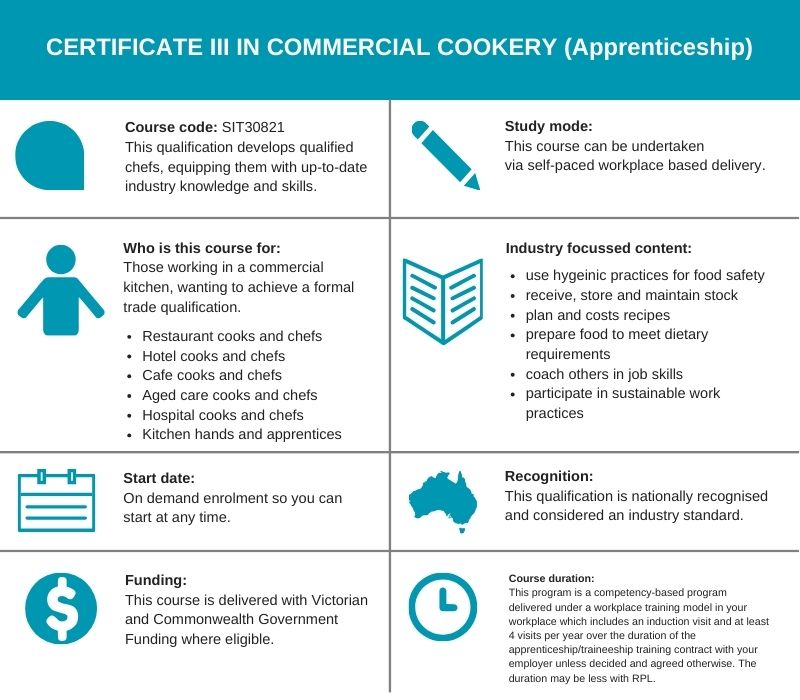Course Structure and Units
| CORE UNITS (TWENTY) | |
| Level 1 | |
| SITXWHS005 | Participate in safe work practices |
| SITXFSA005 | Use hygienic practices for food safety |
| SITXINV006 | Receive, store and maintain stock |
| SITHKOP009 | Clean kitchen premises and equipment |
| SITHCCC023 | Use food preparation equipment |
| SITHCCC027 | Prepare dishes using basic methods of cookery |
| SITHCCC028 | Prepare appetisers and salads |
| SITHCCC029 | Prepare stocks, sauces and soups |
| Level 2 | |
| SITHCCC030 | Produce vegetable, fruit, egg and farinaceous dishes |
| SITHCCC031 | Prepare vegetarian and vegan dishes |
| SITHCCC035 | Prepare poultry dishes |
| SITHCCC036 | Prepare meat dishes |
| SITHCCC037 | Prepare seafood dishes |
| SITHCCC041 |
Produce cakes, pastries and breads |
| SITHPAT016 | Produce desserts |
| SITXFSA006 | Participate in safe food handling practices |
| Level 3 | |
| SITHCCC043 | Work effectively as a cook |
| SITHCCC042 | Prepare food to meet special dietary requirements |
| SITHKOP010 | Plan and cost recipes |
| SITXHRM007 | Coach others in job skills |
| SPECIALISED FOOD ELECTIVE UNITS (FIVE) | |
| BSBSUS211 | Participate in sustainable work practices |
| SITHCCC025 | Prepare and present sandwiches |
| SITHCCC026 | Package prepared foodstuffs |
| SITHCCC044 | Prepare specialised food items |
| SITXINV007 | Purchase goods |
| BUFFET SERVICE ELECTIVE UNITS (FIVE) | |
| BSBSUS211 | Participate in sustainable work practices |
| SITHCCC025 | Prepare and present sandwiches |
| SITHCCC026 | Package prepared foodstuffs |
| SITHCCC038 | Produce and serve food for buffets |
| SITXINV007 | Purchase goods |
Pre requisites
There are no pre-requisites for entry to the Certificate III Commercial Cookery Apprenticeship course.
Employment Outcomes
When this course is undertaken as a Cookery Apprenticeship, successful completion of this course provides the skills and knowledge to perform as a qualified cook or chef in a restaurant, hotel, cafe, health or aged care environment.
This is a nationally recognised qualification, that also cover a range of general employability skills that are required in the hospitality industry including; communication, teamwork, problem solving, initiative and enterprise, planning and organisation, self-management, learning and technology.
Enrolment
To enrol in this course you must be at least 15 years old. The course can be delivered on a full-time or part-time basis. So it is suitable for a range of employees, as well as school based apprentices.
AVTES welcomes students from disadvantaged groups or with disabilities to apply.
Email hello@avtes.com.au to enrol now.
Fees
Course prices for the Certificate III in Commercial Cookery.
| Stream | Tuition Fees (SFP – T/A) | Tuition Fees (SFP – T/A Concession) | Tuition Fees (Full Fee / RPL) |
| Specialised Food | $1,309.50 | $261.90 | $14,841.00 |
| Buffet | $1,262.25 | $252.45 | $14,305.50 |
Our Fees page covers how we set our fees and includes refund information. It adheres to government requirements set annually. All fees are based on qualification program hours and tuition fees may vary depending on units/hours undertaken and student tuition fees as published are subject to change given individual circumstances at enrolment.
Government Funding
This course is eligible for government funding. To see if you meet eligibility requirements check out our Government Funding Opportunities page, or simply contact us directly.
Course Duration and Delivery Mode
This program is a competency-based program delivered under a workplace training model in your workplace which includes an induction visit and at least 4 visits per year over the duration of the apprenticeship/traineeship training contract with your employer unless decided and agreed otherwise. The duration may be less with RPL.
Training Hours and Commitment
To ensure a student meets and progresses through their course requirements and completes within the nominated duration, it is recommended they commit time each week to complete course work and assessments and attend any scheduled visits with the Trainer.
The specific number of hours to commit will vary and depend on the capacity of each individual. Under the workplace training model, the workplace is required to provide an (full-time) Apprentice or Trainee 3 hours per week withdrawn from normal or routine duties for the purpose of this training.
Note: Weekly hours committed to the program will vary depending on the unit of competency being undertaken.
Assessment Methods
Assessment of this course may involve the following types of assessment.
- Short answer questions
- Knowledge tests
- Projects
- Practical tasks
- Supervisor verification
- Demonstrations
- Recognition of prior learning (RPL)
RPL and Credit Transfers
RPL, or recognition or prior learning, is available to all applicants. You will be asked to provide a portfolio of supporting evidence upon enrolment. We honor credit transfers from all current nationally recognised training. You will need to provide statements of attainment from your previous study. To find out more about how to provide information for credit transfers or RPL see here.
Further Training Opportunities
This qualification can form part of an Australian Apprenticeship pathway. Upon completion of this qualification, there are further opportunities to study at a Certificate IV or Diploma level in either a hospitality or other related qualification as offered by a Registered Training Organisation.

